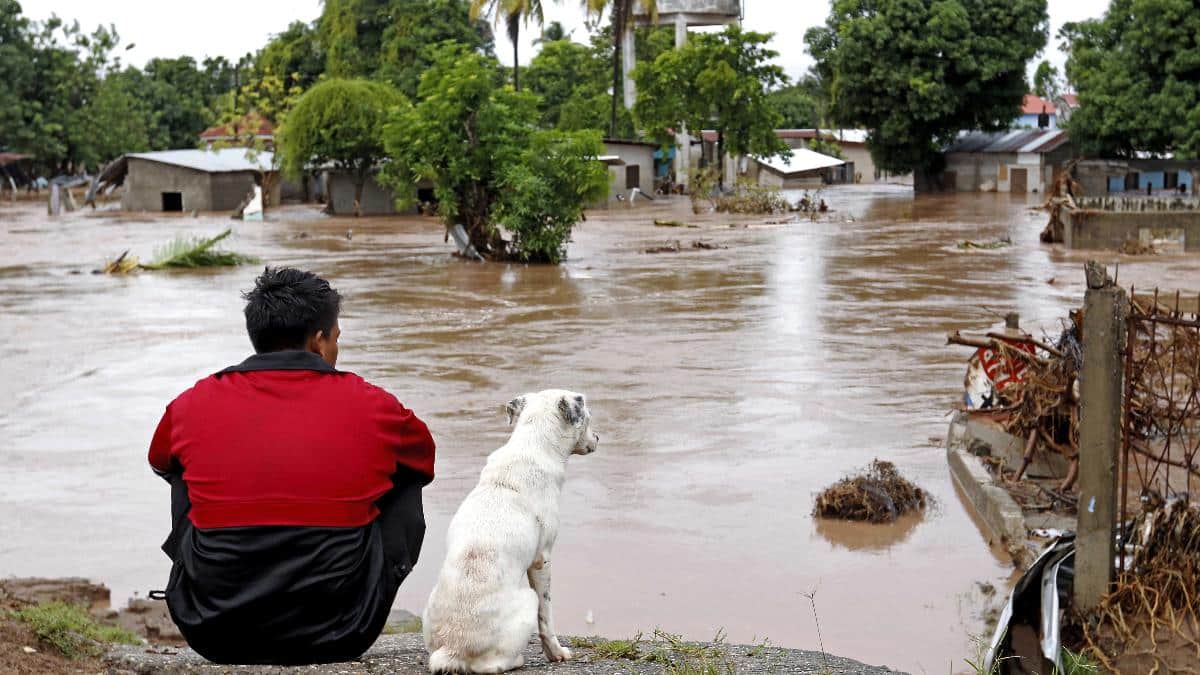
Back-to-Back Hurricanes in Central America Push Migrants North, Adding to Humanitarian Crisis

A man and his dog look at a flooded area in El Progreso, in the Honduran department of Yoro, on Nov. 18, 2020 after the passage of Hurricane Iota which made landfall in Nicaragua as a catastrophic Category 5 hurricane. STR / AFP via Getty Images
When back-to-back hurricanes struck Central America last November, families in the region were already facing a food shortage, violence and economic decline from the ongoing COVID-19 pandemic.
Four months later, people affected by Hurricanes Eta and Iota are struggling to recover, and the impacts of the storms are just beginning to be felt by agriculture communities, prompting some experts to link climate change to the recent surge in migrants arriving at the US-Mexico border, Vox reported.
“The hurricanes were… the last in the series of what was a devastating year,” Meghan López, the International Rescue Committee’s regional vice president for Latin America, told CNN. “To have the pandemic on top of that, to have aid to the region cut, all of these things create this pressure cooker where there’s no escape valve… And the only escape valve is to try to flee the terrible situation people are living in… People are making desperate decisions.”
The hurricanes left “200 people dead and another 5.3 million people in need of assistance, including more than 1.8 million children,” according to UNICEF, Vox reported. They also came at the same time as harvest, causing some regions to lose 40 percent of corn crops and 65 percent of bean crops.
“(Hurricane) Eta – plus the pandemic – left us with nothing,” a Honduran father told CNN, after being deported by U.S. authorities to Reynosa, Mexico.
When major storms have hit the region in the past, farmers tended to move to urban areas for better employment opportunities, said Kayly Ober, a senior advocate and program manager for the Climate Displacement Program at Refugees International. Yet due to the pandemic, these same opportunities haven’t been available, Vox reported.
The pandemic is also limiting opportunities at the border, where an increasing amount of unaccompanied minors are being held beyond legal limits in facilities because the Department of Health and Human Services has run out of space to house people, CNN reported.
In the U.S., political leaders are struggling to determine the best approach to solving the border crisis. “Politically, it’s never the “right time” for immigration reform,” Veronica Escobar, a Democratic representative from El Paso, Texas, wrote in a recent opinion piece published in The New York Times. “The good news is that we now have an administration willing to work on the issue.”
On Wednesday, President Joe Biden announced that Vice President Kamala Harris would lead the way in addressing immigration issues on the southern border. Harris’ approach will focus on slowing the flow of migrants by determining “the root causes” of why people are coming north in the first place, POLITICO reported.
While running for president, Biden “proposed spending billion over four years to tackle violence, climate change and government corruption in the Northern Triangle region — comprised of El Salvador, Guatemala and Honduras,” POLITICO reported. Ober told Vox that the Biden administration is putting too much emphasis on stopping migrants from coming north, rather than viewing it “with a humanitarian lens.”
Other experts have criticized the U.S. for its lack of international aid, leaving migrants with no other choice but to come north. “Many families have nothing to go back to and are now left with little options to survive,” Laurent Duvillier, a spokesperson for UNICEF’s Latin America and Caribbean regional office, told Vox. “Unless more humanitarian support is provided to Central American countries affected by these tropical storms, unless conditions are created in communities for people to be able to stay, it is expected that more families will migrate north in search for a better future for their children.”

 233k
233k  41k
41k  Subscribe
Subscribe 